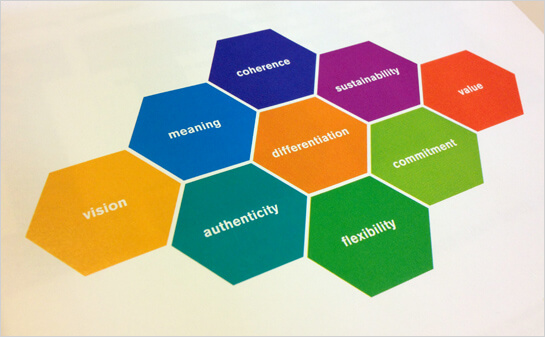*Photo source: http://www.hexanine.com/zeroside/qa-with-alina-wheeler-on-designing-brand-identity-4th-edition/
If you spend much time with Fierce, you know that we value strategy above all else in each of our creative endeavors. Brand strategy is a phrase you will hear often around our offices. In the late 1950s, Charles Eames said that only when you get into the problem and the problem becomes clear, can creativity take over. We believe that creativity is then a fierce and magical discipline—one that can visually and verbally express strategic direction.
I saw this article pop up today in my news feed from HBR and I appreciated the simple reminders it brought as it relates specifically to business strategy. It talks about the importance of radical differentiation when it comes to creating your business strategy. For example, if “service excellence” and “operational effectiveness” are two parts of your business or brand strategy, the author states that “all that can be said about them is that they are non-stupid and that is hardly an exemplary level of accomplishment.”
Here is his premise:
The finest strategies are those in which other competitors do things largely, if not diametrically, opposed to what you do — and make money doing them. That means that you have made a distinctive choice. Vanguard made a real choice when it said it would not sell managed funds. We know it was a real choice because Fidelity focuses on selling managed funds, and makes enormous sums of money doing that.
It is not as though great service is a bad way to win. It is just that stated at that level of generality and abstraction, it is something that any company in the industry will strive for. Hence nobody does the opposite and it is really not a choice. Choosing to define service in a way that is different than others define it is a legitimate strategy. Four Seasons defines luxury as service that makes up for what you left at home or the office. Its luxury competitors define it as grand architecture and décor and obsequious service. Those are real choices because the opposites aren’t stupid; in fact other hotels do something that is reasonably close to the opposite of what Four Seasons does.
So do a little test of your strategy before committing to it. Ask: Is the opposite stupid on its face? Have most of my competitors made the same choice as me? If the answers are “yes,” you have more work to do to have a smart strategy rather than just a non-stupid one.
Excellent advice.
You can read the entire article here: https://hbr.org/2015/05/the-first-question-to-ask-of-any-strategy





